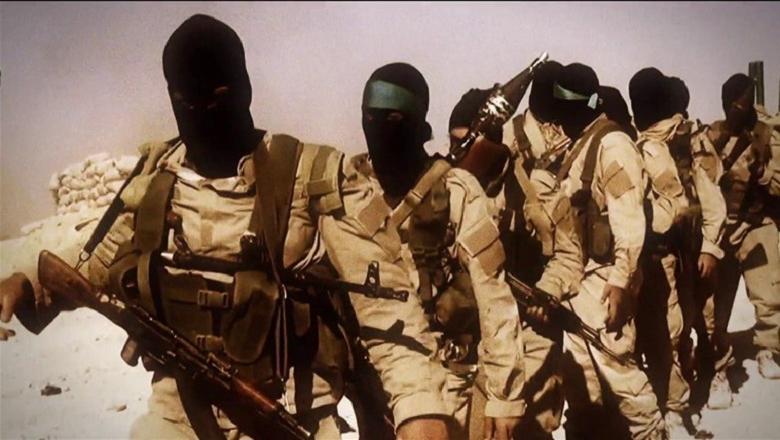Despite governments’ concerns, numbers of ISIS foreign fighters returning home and engaging with violent extremism remains relatively low. Of far greater risk, is the growing threat from Islamic State in both its former stronghold in Iraq and Syria, and in terrorist zones around the world.
16 July 2020
The return of ISIS? Jihadis fleeing into Asia and detainees in Syria and Iraq pose a greater danger than terrorists returning home
Dr Francesco Milan, Defence Studies Department
Analysis by researchers in the Defence Studies Department, in collaboration with Institute for Strategic Studies (IISS)

ISIS foreign fighters have been relocating out of Syria and Iraq to join other jihadist frontlines around the world, according to new research. It warns these ‘career foreign fighters,’ together with those detained in poorly defended prisons and detention centres in Syria and Iraq, could risk the resurgence of an ISIS caliphate.
The analysis by researchers in the Defence Studies Department, King’s College London, in collaboration with Institute for Strategic Studies (IISS), has shown that whilst media and governments have focused on the threat from returning ISIS fighters to the UK and rest of Europe, less attention has been given to the flow of veteran jihadi fighters to other conflict zones in Southeast Asia and Africa.
They warn that inaction from Western governments in dealing with ISIS detainees in Syria and Iraq and a worsening humanitarian situation, provides a perfect breeding ground for a revival of the terrorist caliphate. This poses a far greater long-term strategic risk to countries in the West, they say in their paper, published in the IISS 2020 Armed Conflict Survey.
Dr Francesco Milan, Lecturer in the Department of Defence Studies, King’s College London, and author of the article said:
An estimated 40,000 foreign fighters joined the caliphate over the past six years, including almost 5,000 European citizens. Far from returning to their countries of origin after the fall of the last ISIS-held territory in 2019, the vast majority have remained in the region or relocated to areas of growing ISIS influence around the world.
Despite no longer existing as a ‘state’, ISIS remains a robust terrorist organisation. Since mid-2019 it has led targeted recruitment and re-distribution of jihadis into conflict zones in other countries from Libya to the Philippines. These ‘relocators’ enable ISIS to evade direct confrontation and to strengthen their operations across the world.
Areas targeted in Asia include regions beset by political instability, such as smuggling routes across the Afghanistan–Pakistan border. In Southeast Asia, at least 100 new foreign fighters having joined ISIS militias in the Philippines following a siege in 2017 which put the country on the jihadist map. Indonesia and Malaysia are also becoming priority relocation destinations.
Additionally, the mobilisation of foreign fighters to Iraq and Syria has not stopped, with the most recent estimates from 2019 suggesting up to 3,000 foreign fighters out of between 14,000 and 18,000 present in the region.
Around 10,000 of these, including wives and children of jihadis, are detained under poor conditions in makeshift prisons. The authors say this has the potential to exacerbate existing grievances and breed a new generation of ISIS militants, especially since the political tensions in Iraq since October 2018 could provide breathing space for ISIS’s insurgency as well as its re-emergence as a state actor.
The paper highlights that, despite appeals from the UN, Western governments are avoiding taking charge of the repatriation, trial, detention and eventual reintegration of ISIS affiliates who are citizens of their countries. Some countries have used national laws to try to convict ISIS fighters, but faced major difficulties in finding evidence.
The authors also say the region has seen further instability with sudden withdrawal of all US military forces from northern Syria in October 2019 and the incursion of Turkish forces into Syrian Army territories. This has led to poorly guarded detention facilities and the escape of an unspecified number of ISIS fighters, with at least 76 jihadists reportedly joining Turkey-backed Syrian militias operating in northern Syria.
They also note how, despite having one of the largest foreign-fighter contingents in Europe and 250–300 captured foreign fighters held in Syria, the UK is pursuing a ‘not-in-my-backyard’ policy by stripping prisoners of their British citizenship but otherwise not dealing with them.
Dr Milan added:
The long-overlooked question of how to deal with captured foreign fighters is rapidly becoming a pressing issue, given the huge numbers of surrendering fighters and their families massing in prisons in Syria. “By overly focusing on returning foreign fighter and pursing a short-term, wait-and-see response to the management of captured foreign fighters, Western governments are leaving us all vulnerable to the re-emergence of a stronger and more wide-spread ISIS presence.

